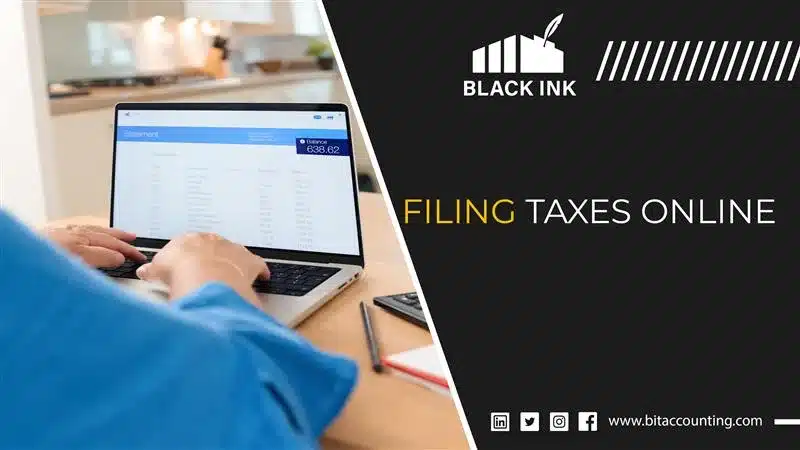
Table of Contents
Filing Taxes Online For The First Time? A Step-by-Step Guide
Filing taxes used to mean paper forms, calculators, and long hours trying to understand complex laws. But times have changed. Today, more people are choose filing taxes online—and for good reason. It’s faster, easier, and more accurate. Whether you’re a student, freelancer, young professional, or just filing for the first time, this guide is here to help.
We’ll walk you through everything from understanding what online filing means to tracking your refund once you’re done. Ready to tackle tax season with confidence? Let’s get started.
What Does It Mean By Filing Taxes Online?
When we say “filing taxes online,” we’re talking about e-filing—the process of submitting your tax return to the Internal Revenue Service (IRS) using tax software or an online service.
Online Filing vs. Paper Filing
- Speed: Online returns are processed faster, often leading to quicker tax refunds.
- Accuracy: Tax software reduces math errors.
- Convenience: File from home, anytime.
Paper filing, on the other hand, involves mailing physical forms. It’s slower and more prone to errors. In today’s digital economy, online filing has become the norm, part of a broader shift in government services and public finance.
Who Can File Taxes Online?
Most individuals in the United States can file taxes online. However, there are some rules:
You Can File If:
- You earn income from a job, self-employment, or investments.
- You have a Social Security number or Individual Taxpayer Identification Number (ITIN).
- You’re a U.S. resident or citizen.
You Might Need Paper Filing If:
- You’re filing for someone who passed away.
- You’re making changes to a previous year’s return and need Form 1040-X.
- Your situation is highly complex (e.g., certain trusts, estates, or rare business ownership scenarios).
Key Tax Terms You Should Know
Understanding the lingo makes tax time easier. Here are some basic terms:
- Gross Income: Your total income before taxes or deductions.
- Adjusted Gross Income (AGI): Your income after certain allowed adjustments.
- Deductions: Expenses you can subtract from income (e.g., student loan interest).
- Credits: Dollar-for-dollar reductions in tax (like the Child Tax Credit or Earned Income Tax Credit).
- Tax Liability: The total amount of income tax you owe.
- Tax Refund: Money you get back if you overpaid throughout the year.
These terms form the core of tax administration and are used throughout your tax return.
Important Deadlines to Remember
- April 15 – Regular filing deadline.
- October 15 – Deadline if you file for an extension.
- State deadlines may vary, so check your state revenue services.
Late filing or late payments may lead to fees and penalties. These are enforced under United States law and tax policy.
Preparing to Do Filing Taxes Online
Here is how to prepare before filing taxes online:
Gather Necessary Documents
Before you log in to your tax software, collect:
- Personal info: SSN or ITIN, bank info for refunds.
- Income documents: W-2s, 1099s, and records of freelance, gig, or investment income.
- Deduction/credit info: Receipts for donations, mortgage interest, health savings account contributions, or education expenses.
Choose the Right Tax Filing Software
Popular options include:
- TurboTax
- H&R Block
- TaxAct
- IRS Free File (via the Free File Alliance)
Free options work well for simple returns. If your finances are more complicated—say, you own cryptocurrency or receive dividends—you might need a paid version. These tools support tax preparation in the United States and simplify navigating financial services and public–private partnerships in the tax world.
Decide on Your Filing Status
Your filing status affects your deductions and credits:
- Single
- Married Filing Jointly
- Married Filing Separately
- Head of Household
- Qualifying Widow(er)
Use the software’s built-in questions to choose the right one.

Determine If You Need a Tax Professional
Sometimes it’s best to get help:
- You’re self-employed.
- You have rental income or capital gains.
- You own a business or work in corporate finance.
A professional helps ensure compliance with economic laws, business law, and complex governance rules.
Step-by-Step Guide to Filing Taxes Online
The following is a step-by-step guide to filing taxes online:
Step 1: Create an Account
Choose a trusted provider and set up your profile. Use a strong password and enable two-factor authentication for safety.
Step 2: Enter Personal Info
Include:
- Full name
- Social Security number
- Address
- Bank info for direct deposit
Step 3: Input Income Details
Upload or type in:
- W-2s, 1099s, and freelance or gig economy income
- Interest, dividends, and royalty payments
- Unemployment benefits or stock sales
If a form is missing, contact the sender or the IRS for help.
Step 4: Claim Deductions and Credits
You’ll be asked:
- Do you want the standard deduction or to itemize?
- Are you eligible for credits like:
- Earned Income Tax Credit
- Child Tax Credit
- Education credits
This step can lower your income taxes significantly.
Step 5: Review Your Return
Look for:
- Mistyped SSNs
- Wrong bank info
- Missed deductions or income
Most software tools offer built-in error checkers.
Step 6: Sign and Submit
You’ll sign using an e-signature. The system confirms successful filing—a vital part of financial accountability in the public sector.
Step 7: Save a Copy
Download a PDF and store it safely. The IRS recommends keeping your tax returns for at least 3 years.
After Filing – What’s Next?
Explore what you should do after filing taxes online:
Tracking Your Refund
Use the IRS “Where’s My Refund?” tool. Most refunds arrive within 21 days.
Made a Mistake?
Don’t panic. You can file an amendment using Form 1040-X. Just make sure you do it before the deadline.
Direct Deposit = Faster Refunds
If you haven’t already, update your bank details for future filings. Direct deposit is quicker and safer than paper checks.
Planning Ahead
- Adjust your withholdings if you owed a lot or got a big refund.
- Keep records organized year-round to make next tax season easier.
- Tools like HTTP cookies can help you save login info securely.
Conclusion
Filing taxes online doesn’t have to be scary or confusing. With the right tools and some preparation, it’s actually pretty simple. From gathering your forms to tracking your refund, you now have a full roadmap to get through tax season with less stress.
And if you need help, BIT Accounting is always here to support your tax journey. We’re pros at helping individuals and businesses manage their personal finance, comply with tax law, and understand their place in the economy of the United States.
FAQs
1: Is filing taxes online safe?
Yes, as long as you use trusted software and secure your data with strong passwords and two-factor authentication.
2: Can I file for free?
Yes! Many people qualify for the Free File program offered through the IRS and Free File Alliance.
3: What if I don’t have a W-2 yet?
Contact your employer. If it’s missing by late February, reach out to the Internal Revenue Service.
4: I’m self-employed—can I still file online?
Absolutely. Many platforms support business economics, self-employment, and even cryptocurrency transactions.
5: What documents should I keep after filing?
Your full tax return, proof of income, and any forms tied to deductions or credits—keep them for at least three years.
Get a Free Quote Today For All of Our Services
Fill out the form below and we will send you a free analysis of your current state and what would be the cost of managing either a separate accounting and bookkeeping services or a complete solution across South Carolina, USA. Do get in touch and we will be happy to consult you with our bookkeeping services in SC, South Carolina, USA.
GET FREE QUOTE FOR ALL OF OUR SERVICES
CharlestonTaxcity will send you a free analysis of your current state and what would be the cost of managing either a separate accounting and bookkeeping services or a complete solution across South Carolina, USA. Do get in touch and we will be happy to consult you with our bookkeeping services in SC, South Carolina, USA.
